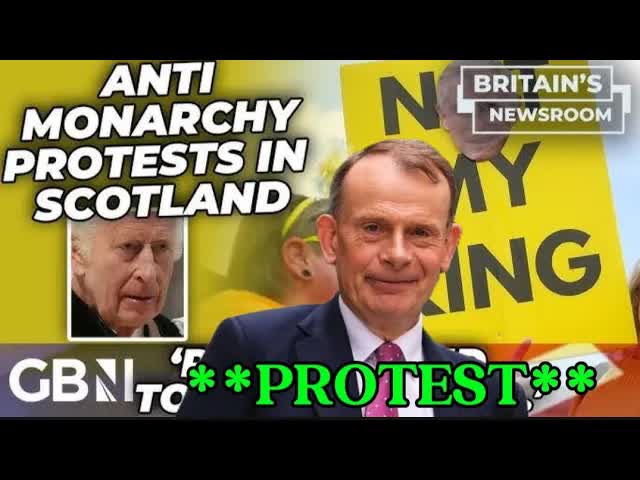In a dramatic turn of events during the coronation of King Charles III, protests erupted across the UK, leading to the arrest of several demonstrators.
The scene unfolded as individuals gathered to express their dissent, holding signs that proclaimed sentiments like “Not my king.”
The police response was swift and forceful, a move that has drawn sharp criticism from various quarters, including veteran journalist Andrew Marr, who voiced his concerns over the implications for free speech in Britain.
Marr’s scathing commentary highlighted the absurdity of a monarchy that cannot withstand a few placards or some booing.
He described the arrests as not only excessive but also detrimental to the monarchy itself.
After all, a system that quakes at the sight of protest signs raises questions about its strength and legitimacy.
Such heavy-handed policing, he argues, risks alienating citizens who might otherwise support the royal institution.
The right to peacefully protest is often regarded as a cornerstone of British democracy.
Even in times of celebration, the ability to voice opposition is essential for a healthy civic discourse.
When authorities suppress these expressions, they undermine the very foundations of a society built on the principles of accountability and change.
In this instance, the arrests have sparked outrage, prompting calls for a reassessment of the government’s approach to dissent.
Eyewitness accounts paint a troubling picture of peaceful protesters being forcibly removed from the scene, merely for expressing their views.
Human rights organizations have condemned this tactic, arguing that it threatens the fabric of democratic society.
As the dust settles, there are growing demands for investigations into the police’s use of force and a reaffirmation of citizens’ rights to assemble without fear.
Critics of the government’s actions argue that the response to these protests represents a troubling trend.
Questions linger about whether the authorities overstepped their bounds, especially given the peaceful nature of the demonstrations.
The balance between maintaining public order and protecting the right to free expression must be carefully navigated, lest we slip into a culture of conformity.
Legal experts warn that the recent arrests could set a dangerous precedent, chilling public willingness to exercise fundamental freedoms.
The implications of such actions extend beyond the immediate situation, potentially stifling dissent and eroding trust in democratic institutions.
If citizens feel their voices are being silenced, the health of democracy itself is at stake.
The stark contrast between the treatment of these protesters and previous demonstrations raises eyebrows.
Many observers note a perceived inconsistency in how the law is applied, particularly when dissent targets the monarchy.
This disparity has only intensified feelings of disenfranchisement among those who believe their rights are being compromised.
As the monarchy grapples with its role in modern society, the recent protests underscore the complexities of its relationship with the public.
While many still hold the institution in high regard, there is an increasing demand for accountability and representation.
The challenge now lies in finding a way to honor tradition while addressing the evolving expectations of the populace.
Politically, the ramifications of these arrests could be far-reaching.
The government’s choice to suppress dissent may backfire, risking further erosion of public trust in both the monarchy and the democratic process.
As the situation continues to unfold, the long-term effects on political stability and civic engagement remain uncertain.
Internationally, the arrests have drawn widespread condemnation.
Human rights advocates have raised alarms about the implications for civil liberties in the UK, questioning whether such actions tarnish the nation’s reputation as a champion of democracy.
Allies are watching closely, urging the government to uphold the rights of its citizens even amidst political shifts.
Moving forward, there is a pressing need for a recalibration of policies regarding public protests.
The heavy-handed response to peaceful dissent signals a need for dialogue around how best to balance public safety with the preservation of civil liberties.
Only through thoughtful engagement can the UK hope to maintain its commitment to democratic values while ensuring that the voices of all citizens are heard and respected.
